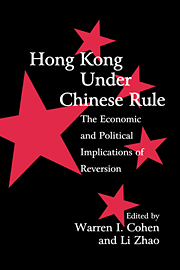Book contents
- Frontmatter
- Contents
- List of Contributors
- Introduction
- 1 Hong Kong as an International Commercial Center
- 2 Cooking the Rice without Cooking the Goose: The Rule of Law, the Battle over Business, and the Quest for Prosperity in Hong Kong after 1997
- 3 Hong Kong Faces 1997: Legal and Constitutional Issues
- 4 The Economic and Political Integration of Hong Kong: Implications for Government–Business Relations
- 5 Hong Kong and Greater China: An Economic Perspective
- 6 One Country, Two Currencies: Monetary Relations between Hong Kong and China
- 7 Political Participation in Hong Kong: Trends in the Mid-1990s
- 8 Strategic and Military Implications of Hong Kong Reversion
- 9 Hong Kong and China's Integration into the International Community
- 10 Hong Kong as a Problem in Chinese–American Relations
- 11 Post–July 1997 Challenges
- Index
1 - Hong Kong as an International Commercial Center
Published online by Cambridge University Press: 22 March 2010
- Frontmatter
- Contents
- List of Contributors
- Introduction
- 1 Hong Kong as an International Commercial Center
- 2 Cooking the Rice without Cooking the Goose: The Rule of Law, the Battle over Business, and the Quest for Prosperity in Hong Kong after 1997
- 3 Hong Kong Faces 1997: Legal and Constitutional Issues
- 4 The Economic and Political Integration of Hong Kong: Implications for Government–Business Relations
- 5 Hong Kong and Greater China: An Economic Perspective
- 6 One Country, Two Currencies: Monetary Relations between Hong Kong and China
- 7 Political Participation in Hong Kong: Trends in the Mid-1990s
- 8 Strategic and Military Implications of Hong Kong Reversion
- 9 Hong Kong and China's Integration into the International Community
- 10 Hong Kong as a Problem in Chinese–American Relations
- 11 Post–July 1997 Challenges
- Index
Summary
HONG Kong's most enduring characteristic has been its remarkable ability to re-invent itself. As old flowers start to fade, new buds appear and grow bigger than their predecessors.
The secret of this rejuvenation has always been in the diversity of interests and enterprises that have found a home here. Though Hong Kong remains a small place, it has always been just about big enough and diverse enough to have “critical mass” – that hard-to-define state which acts as a natural magnet for enterprising people and for new ventures which prosper quickly in proximity to older and more established enterprises. Over time, the principal activities change, but there is still an accretion of functions. The older functions shrink in relation to the larger total mass.
Critical mass cannot be taken for granted. Its sustenance is openness to the outside world and competent – but minimalist – government at home. Call it a colony (as was the case and technically still is); a territory (as it currently prefers); a Special Administrative Region, or SAR (which it is soon to become) – the key to Hong Kong's success has been, and will remain, that it is a rather peculiar institution which thrives on the contradictions around it.
Hong Kong has only one natural advantage: its harbor. Effective and magnificent though it may be, this harbor is not a unique attribute on the south China coast. History has proved a much more important advantage.
- Type
- Chapter
- Information
- Hong Kong under Chinese RuleThe Economic and Political Implications of Reversion, pp. 8 - 30Publisher: Cambridge University PressPrint publication year: 1997

